Bisphosphonate & Calcium Timing Calculator
How to Maximize Your Medication Effectiveness
Taking bisphosphonates and calcium at the wrong time can reduce medication effectiveness by up to 90%. This tool helps you calculate the proper timing based on medical guidelines.
Recommended Medication Timeline
Key Guidelines
- Empty stomach: Take bisphosphonate with water only, at least 30 minutes before eating
- Stay upright: Remain upright for at least 30 minutes after taking bisphosphonate
- Calcium timing: Take calcium with meals or later in the day (at least 30 minutes after bisphosphonate)
- Maximum calcium: Do not exceed 1200 mg daily from supplements (combined with food intake)
Why Your Osteoporosis Medication Might Not Be Working
You’re taking your bisphosphonate like clockwork-every Sunday morning, right after you wake up. You’ve got your calcium pill right next to it, just in case you forget. You swallow both with a glass of water, grab your coffee, and go about your day. Sounds responsible, right? But here’s the problem: you’re probably wasting half the benefit of your medication.
Bisphosphonates like alendronate, risedronate, and zoledronic acid are powerful drugs. They’re designed to slow down bone loss, reduce fracture risk by up to 50% in the spine, and help you stay active as you age. But they don’t work if they can’t get into your body. And calcium? It’s not your friend when taken at the same time. It’s more like a silent saboteur.
How Bisphosphonates Actually Work
Bisphosphonates are synthetic molecules built to stick to bone. Once they land on the surface, they target the cells that break bone down-osteoclasts. These cells are like tiny demolition crews. When they’re too active, your bones become thin and weak. Bisphosphonates shut them down by interfering with their energy supply, effectively putting them to sleep. The result? Bone density improves over time, and fractures become less likely.
But here’s the catch: bisphosphonates are notoriously hard for your body to absorb. Only about 1% of the pill you swallow actually gets into your bloodstream. The rest just passes through. That’s why timing and conditions matter so much. If you take them with food, coffee, milk, or-most commonly-calcium supplements, absorption drops by up to 90%.
The Calcium Problem: Why Timing Is Everything
Calcium is essential. Your bones need it. Your muscles need it. Your nerves need it. But when calcium ions meet bisphosphonates in your stomach, they form a tight, insoluble bond. Think of it like mixing oil and water. They don’t blend. They clump together and get flushed out before your body can use either one.
That’s why guidelines from the American College of Rheumatology, the Endocrine Society, and the International Osteoporosis Foundation all say the same thing: take bisphosphonates on an empty stomach, with plain water only, and wait at least 30 to 60 minutes before eating, drinking anything else, or taking calcium.
It’s not just a suggestion. It’s a pharmacological rule backed by clinical studies. One 2006 study from Procter & Gamble found that nearly 40% of patients took calcium at the same time as their bisphosphonate-completely undermining the treatment. And it’s not because they’re careless. Most just didn’t know.

What About Vitamin D?
You can’t talk about calcium without talking about vitamin D. Your body needs vitamin D to absorb calcium from your gut. If you’re low on vitamin D, even perfectly timed calcium supplements won’t help much. Most experts recommend 800 to 1,000 IU of vitamin D daily alongside calcium. You can get it from sunlight, fatty fish, or supplements. But don’t take it with your bisphosphonate either. Wait until after your 60-minute window.
And here’s something many don’t realize: your bone health isn’t just about pills. It’s about diet too. A cup of yogurt, a serving of kale, or a glass of fortified orange juice adds up. The goal isn’t to replace food with pills-it’s to fill the gap. Most adults need 1,000 to 1,200 mg of calcium daily total. If you’re getting 600 mg from food, then 500-600 mg from supplements is enough. More than that? It might do more harm than good.
The Risk of Too Much Calcium
There’s a growing concern among researchers that too much supplemental calcium-especially above 1,200 mg per day-could raise the risk of heart problems. A 2011 study in the Journal of Bone and Mineral Research suggested that high-dose calcium without vitamin D might lead to calcium buildup in arteries. That doesn’t mean you should stop calcium. It means you should be smart about it.
Don’t just pop two 600 mg pills because you think “more is better.” Check your diet. Use a food tracker for a week. See where you stand. Then, if you’re short, add just enough to hit the target. And always pair it with vitamin D.
Real People, Real Mistakes
On Reddit’s r/Osteoporosis forum, over 12,000 people share their stories. A 2022 survey there found that 67% of users initially took calcium with their bisphosphonate. Many thought they were being proactive. Others just forgot the rule. One user wrote: “I took my Fosamax and my calcium together for six months. My doctor said my bone density didn’t improve. Turns out, I was wasting my time.”
Another common mistake? Lying down right after taking the pill. Bisphosphonates can irritate your esophagus if they don’t wash down properly. That’s why you’re told to stay upright for at least 30 minutes. A Cleveland Clinic survey of 1,200 patients found that 28% who didn’t follow this rule reported burning or pain in their chest-often mistaken for heartburn.
And then there’s adherence. Nearly 60% of people stop taking bisphosphonates within the first year. Why? Side effects, yes-but also complexity. “I had five different pills to take at five different times,” one 72-year-old woman told the National Osteoporosis Foundation. “I gave up.”

Solutions That Actually Work
There’s a reason companies like Warner-Lambert (now part of Pfizer) created the Actonel with Calcium combo pack. It’s not marketing. It’s medicine. The pack includes one risedronate tablet and six calcium tablets in separate compartments. The instructions are printed right on the blister pack: “Take risedronate Sunday morning, 30 minutes before breakfast. Take calcium Monday through Saturday with meals.”
That simple design improved adherence by 28% in clinical trials. Users rated it 4.2 out of 5 on Drugs.com, with comments like: “Finally, I know when to take what.”
If your pharmacy doesn’t offer something like this, ask. Or use a pill organizer with labeled sections. Set phone alarms: one for your bisphosphonate, another for your calcium, and a third for your vitamin D. Make it part of your routine-not an afterthought.
When to Stop-And When to Keep Going
Bisphosphonates aren’t forever. Because they stick to bone for years-even over a decade-you can take a break. This is called a “drug holiday.” After 3 to 5 years of treatment, if your fracture risk is low and your bone density is stable, your doctor might suggest pausing the medication. Your bones still hold onto the drug, so the protection lasts.
But don’t stop without talking to your doctor. If you’ve had a fracture, are over 75, or have a very low bone density score, you may need to stay on longer. The risk of a hip fracture-20% of people die within a year of one-is far greater than the risk of rare side effects like jaw bone damage (osteonecrosis) or atypical femur fractures, which affect fewer than 1 in 10,000 people per year.
As Dr. Ethel Siris from Columbia University says: “The risk of not treating is way higher than the risk of treating.”
Bottom Line: Do This Right
If you’re on a bisphosphonate, here’s your simple checklist:
- Take your bisphosphonate first thing in the morning, on an empty stomach, with a full glass of plain water.
- Wait at least 30 minutes (60 is better) before eating, drinking, or taking any other pills-including calcium or vitamin D.
- Stay upright-no lying down-for at least 30 minutes after taking it.
- Take your calcium supplement with a meal later in the day. Split doses if you’re taking more than 500 mg at once.
- Take your vitamin D daily, preferably with your calcium.
- Don’t guess your calcium intake. Track your food for a week. Supplement only what’s missing.
- Talk to your doctor every year about whether you still need the bisphosphonate.
It’s not complicated. But it’s easy to mess up. And when you do, you’re not just wasting a pill-you’re risking your future mobility, your independence, and your life.
Can I take calcium and bisphosphonates together if I swallow them with lots of water?
No. Even with lots of water, calcium and bisphosphonates form a chemical bond in your stomach that prevents absorption. Water doesn’t break that bond. The only reliable way to avoid this interaction is to separate them by at least 30 to 60 minutes.
What if I forget and take them together? Should I take another dose?
Don’t double up. Taking another dose increases your risk of stomach irritation and doesn’t fix the absorption problem. Just wait until tomorrow and follow the correct timing. One missed dose won’t ruin your treatment-consistent mistakes will.
Is it okay to take calcium at night instead of in the morning?
Yes, and it’s often better. Your body absorbs calcium more efficiently when taken with food, and nighttime is a good time to pair it with dinner or a snack. Just make sure it’s at least 30 minutes after your bisphosphonate and not close to your next dose.
Do I need calcium if I drink milk every day?
Maybe not. One glass of milk has about 300 mg of calcium. If you eat yogurt, cheese, broccoli, or fortified foods, you might be getting enough. But most adults still fall short. Use a free nutrition app to track your intake for a week. If you’re under 1,000 mg total, supplement the gap.
Can I take bisphosphonates with tea or coffee?
No. Tea, coffee, juice, and even mineral water can interfere with absorption. Only plain water is safe. Wait at least 30 minutes after taking the pill before drinking anything else.
How long do I need to take bisphosphonates?
Most people take them for 3 to 5 years, then take a break-called a drug holiday-if their fracture risk is low. Your doctor will monitor your bone density and overall health to decide when to pause or continue. Never stop without medical advice.
Are there alternatives if I can’t tolerate bisphosphonates?
Yes. If you have severe stomach issues or can’t follow the strict dosing rules, your doctor may recommend denosumab (Prolia), teriparatide (Forteo), or romosozumab (Evenity). These work differently and don’t require the same timing restrictions. But they’re usually reserved for higher-risk patients or those who can’t use bisphosphonates.





One comment
i took my fosamax and calcium together for 6 months... my doc said no change. turns out i was just wasting my time. oops.
this is so important. so many people think more calcium = better bones. no. it's about timing. i learned this the hard way after two stress fractures.
let me tell you something about bisphosphonates and calcium absorption. it's not just about the chemical bond-it's about pH gradients in the gastric lumen, the ionization state of phosphate groups, and how calcium competes for divalent cation transporters in the duodenum. i've read every clinical trial since 2005. the data is crystal clear: concurrent intake reduces bioavailability by up to 90%. don't just take it with water-take it with discipline. your spine will thank you.
wait so i can't have my morning coffee with my pill? like... at all? not even a sip?
I've seen this so many times: people take their meds like they're following a recipe-'add one cup calcium, one tablespoon bisphosphonate, stir with coffee.' No. It's not baking. It's pharmacokinetics. There's a reason the FDA requires specific labeling. Ignoring it isn't 'forgetful'-it's scientifically negligent.
why are we still talking about calcium supplements? we're not cavemen. eat food. kale. sardines. yogurt. if you need a pill you're already doing it wrong. also, bisphosphonates are overhyped. i've seen more side effects than benefits in my clinic.
i just set 3 alarms. one for the pill, one for calcium, one for vitamin d. it's not hard. just stop making it complicated.
i used to take everything at once because i was tired of juggling pills. then i broke my wrist falling off the curb. i was 68. now i treat my meds like a sacred ritual: water, upright, wait, then food. it's not about being perfect-it's about being consistent. and yeah, i still forget sometimes. but now i forgive myself and reset. that's how you survive aging.
actually, some studies suggest that calcium carbonate is less interfering than calcium citrate when co-administered, due to lower solubility. also, if you're on PPIs, your stomach pH is elevated, which might reduce bisphosphonate absorption even further. you should consider switching to citrate if you're on acid blockers. just saying.
we treat bones like they're bricks in a wall you can just stack with pills. but bones are alive. they breathe, they remodel, they whisper to you when they're lonely. bisphosphonates don't fix loneliness. they just silence the demolition crew. what you really need is movement. sunlight. laughter. and maybe a damn walk around the block before you swallow that pill.
so you're telling me i can't drink my coffee until 30 minutes after i take my pill? wow. that's like asking me to wait 30 minutes before breathing. i'll just take the calcium at night then. genius.
the 90% absorption drop is a lab number. real people don't live in test tubes. i've been taking them together for 4 years. my DEXA scores are fine. stop scaring people with statistics.
this is why american healthcare is broken. we turn simple things into complex rituals. in my country, we just take the pill and eat. if your bones break, you die. no one cares about the 1% absorption rate. get over it.
i made a printable chart with times and colors: red for bisphosphonate, green for calcium, blue for D. printed it, laminated it, taped it to my fridge. now my whole family knows. my mom even reminds me. 🙌
took my pill at 7am, waited 45 min, had oatmeal. calcium at dinner. vitamin d at bedtime. done. life's too short to overthink pills.